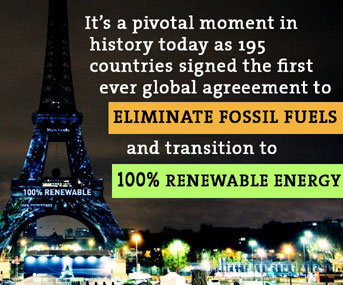Calling the Paris Climate Agreement "a turning point in global efforts to combat climate change and anchor economic growth in clean development," President Obama and Canadian Prime Minister Trudeau ended their first meeting with a long announcement on areas for climate collaboration.
During their press conference, Obama said, "I’m especially pleased to say the United States and Canada are fully united in combating climate change."
From protecting the Arctic to cutting emissions from vehicles, oil and gas drilling and HFCs, they "resolve" to play a leadership role in furthering a global low carbon economy. They plan to work closely with Mexico to develop "a comprehensive and enduring North American climate and energy partnership."

Canada and the US will collaborate on:
- Paris Agreement: work together on implementation in our two countries and in developing countries through assistance on meeting and strengthening their pledges.
- Methane Emissions: both countries adopted a target of cutting methane emissions from oil and gas drilling 40-45% by 2025, below 2012 levels – from existing and new wells. Environmental agencies in both countries will move on this immediately –
EPA announced these goals last year, and Interior introduced methane regulations for public land. They will also encourage the G-20 to move on methane.
The industry is the single largest source of methane emissions globally. "This is arguably the single biggest, most impactful, most immediate thing we can do to slow the rate of warming right now," Mark Brownstein of Environmental Defense Fund says.
- Carbon forcing HFCs: will work together to get an amendment to the Montreal Protocol this year that phases out HFCs, while continuing to use public procurement to purchase green alternatives.
- Fuel Economy Standards will be the same for both countries for all vehicles to accelerate efficiency and zero emission technologies.
- Aviation: implement a carbon standard for the industry and foster technological and operational advancements that cut emissions.
- Phase Out Fossil Subsidies; accelerate renewable energy deployment and facilitate integration in interconnected grids; align energy efficiency standards and expand Energy Star.
- Protect Arctic Biodiversity by setting aside at least 17% of land and 10% of marine areas by 2020, with goals for much more in following years. Commerce in the Arctic will occur "only when the "highest safety and environmental standards are met, including national and global climate and environmental goals, and Indigenous rights."
They are working for a binding international agreement to prevent unregulated fishing in the Arctic.
This year, the two countries will develop a science-based standard for evaluating the life-cycle impact of Arctic commerce. They will establish mutual policies for low-impact shipping corridors.
Read the full announcement:
